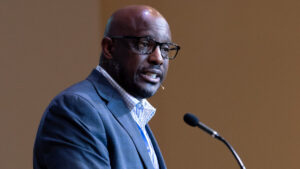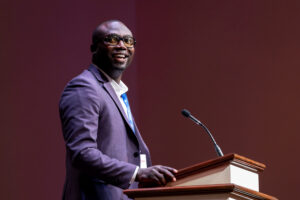This is a trying time for student pastors and other church leaders. Usually, in March and April, student pastors busy themselves with church activities, preparing weekly Bible studies, attending student sporting events, etc.
With summer only a few weeks away, the tasks of planning mission trips, camps, retreats, home group meetings, etc., pile up and can create a season of busyness that we all pray will yield spiritual fruit in the months ahead. This, of course, describes the typical March and April, but in 2020 March and April are proving to be nothing typical.
Our nation and churches are currently faced with responding to the Coronavirus (COVID-19) pandemic, the spread of a respiratory disease originating in China.
A pandemic is a global outbreak of disease. Pandemics happen when a new virus emerges to infect people and can spread between people sustainably. Because there is little to no pre-existing immunity against the new virus, it spreads worldwide. The virus that causes COVID-19 is infecting people and spreading easily from person-to-person. Cases have been detected in most countries worldwide and community spread is being detected in a growing number of countries (CDC).
This virus has many church leaders questioning not only their immediate plans but plans for Easter as well as the summer months.
Consider the following circumstances that have arisen in recent days. The CDC has suggested the cancellation of any public gathering of more than 50 people. This includes churches, worship gatherings.
A great many churches across the state of Alabama chose to cancel their gatherings or at least alter them significantly, for Sunday, March 15, 2020.
In Alabama, the governor has announced the closure of all public schools until April 6 (which may be extended even further). This includes not only the typical school day (8 a.m. – 3 p.m.) but also athletics and other extracurricular activities (baseball, softball, soccer, track, and field, choir, concert band, etc.).
As more information circulates and an increasing number of people test positive for COVID-19, many cities are following the governor’s example: closing parks, sports leagues, and public gathering places.
With the world on alert from this pandemic, how will our student ministries be affected? Many student pastors and churches have canceled Wednesday activities and are scrambling to find a way to possibly Livestream a message or create a Bible study group using mobile apps or social media.
Wherever you find yourself in this chaos, take these considerations into consideration:
1. Consider others, not just yourself.
As discussions of COVID-19 ramped up, I grew disheartened at the overreaction of the public, news media, and elected officials. Compared to other viruses, why are we were making such a big deal?
I reached a new level of anger when my son’s baseball league suspended activities. This illness that wasn’t an issue for me was now becoming an issue for me.
But it didn’t take long for the conviction to set in that I was way too focused on myself and not on others.
The virus will likely not greatly affect my personal health in a negative way if I were to contract it.
But what about those with whom I come in contact? Will my self-centeredness cause someone else to suffer? I hope not. Does God love me more than others? Of course not!
Rather than focusing on my inconveniences, perhaps I should heed the words of the Apostle Paul who commented on the character of Jesus thusly:
Do nothing from selfish ambition or conceit but in humility count others more significant than yourselves. Let each of you look not only to his own interests but also to the interests of others. Have this mind among yourselves, which is yours in Christ Jesus… Philippians 2:3-5a (ESV)
2. Consider the emotional toll, not just the physical toll.
Can you imagine your senior year being cut short and your sports season being ended when you had expectations to make a run at a state championship? What if you weren’t able to walk at graduation? What about prom? For students, this is becoming a reality.
Aside from students, all walks of life are experiencing anxiety and times of sadness from the decisions being made in response to COVID-19.
My former pastor used to repeat the adage, “People won’t care how much you know until they know how much you care.”
Now is an opportunity to demonstrate concern for your church family and others. Call and check on students to see how they’re coping. Pray with them on the phone. Listen to their concerns and empathize.
It’s not only those who contract the virus who will suffer. Suffering takes various forms and as their pastor, you can make a great impact in their lives by proving yourself to be reliable and present in their time of need.
3. Consider the Kingdom, not your kingdom.
“The time is fulfilled, and the Kingdom of God is at hand; repent and believe in the gospel” (Mark 1:15, ESV).
Jesus’ teachings centered around the Kingdom of God. God’s Kingdom has been misunderstood by God’s people for thousands of years.
As Jesus tells us in John 18:36 (ESV): “My kingdom is not of this world. If my kingdom were of this world, my servants would have been fighting, that I might not be delivered over to the Jews. But my kingdom is not from the world.”
Jesus’ Kingdom was a spiritual kingdom. Often, however, our efforts shift from a spiritual focus to a material, worldly focus.
Student ministry, not unlike most ministries in the Church today, typically thrives on visible results. Many churches and student pastors gauge success by the number of students they draw in weekly.
Now that services are being canceled, this presents a challenge to the student pastor who bases success in attendance alone. It can cause one to feel useless or even depressed since the ministry can’t function as it was designed.
Be reminded, however, that Jesus’ spent His ministry investing heavily not into the crowds but into the few. He invested in 12 men and even more heavily invested into three of those twelve.
COVID-19 may take a hit on our kingdoms we’ve built in our student ministries. Our weekly gatherings may falter or halt for the time being.
But the Kingdom of God can and must be advanced at all costs. Souls are still precious to God and to His Church.
Consider ways that your church or ministry can fulfill the basic functions of the church given the current circumstances.
Use Acts 2:42 (ESV) as a guide when the disciples “devoted themselves to the apostles’ teaching and the fellowship, to the breaking of bread and the prayers.”
4. Consider the needs, not your wants.
As a student pastor, I cherish my Wednesday nights. I love to teach the Word of God to my students. I love gathering for a time of midweek worship. I love the silly games and seeing teenagers from different schools and walks of life unite for worshipping King Jesus.
COVID-19, however, had brought about schedule changes to the church and our communities. The abrupt changes in our communities will undoubtedly bring about abrupt needs that have not yet been addressed.
Specific needs will vary from community to community, but there are several common issues that will arise regardless of your church context. Consider these needs that you can help address:
A. School Lunches
With schools being canceled for the next several weeks, there will inevitably be students who have relied on schools to provide weekday breakfasts and lunches. Perhaps your church family can connect with local schools to devise a way to provide meals or funding for meals for families with children.
B. Grocery Shopping
We have all seen the stories of the shortage of certain necessary items at local grocery stores. The stores will restock. But the call for quarantine, especially to those most susceptible to suffering from COVID-19, remains.
Perhaps your church can devise a way to grocery shop for essential items for elderly, at-risk members of your congregation. Maybe there are unchurched individuals who need the same service.
What a great way to evangelize through meeting physical needs and bridging a relationship with others who need the Gospel of Jesus Christ.
C. Prescription Pickups
Many individuals have medical needs requiring daily, weekly or monthly prescription medicine pickups. Similar to grocery needs, many of these citizens do not need to be in public. Your church family can help by picking up needed medicines and delivering to those who need them.
Obviously this is a sensitive issue and there are certain legal issues to be considered, but the need still exists.
D. Babysitting Needs
With daycares shutting down and parents still working, there may be an opportunity for some of your trained students to offer sitting services in the weeks ahead.
5. Consider praying, not complaining.
Above all, the Church cannot forget the Gospel of Jesus Christ has, for 2,000 years, advanced in seasons of comfort and in seasons of strife. But it is in the seasons of strife where the Gospel has advanced at its greatest rate historically.
God’s Word is filled with encouraging passages reminding God’s people of His faithfulness in uncertain times.
God’s Kingdom will always endure, and we can choose today whether we want to be part of that advance or if we choose to be bystanders who complain while true followers of Jesus work for Christ and His glory.
What good does it do to complain on social media? How many people have been won to the Gospel through church members scoffing at the decision of those in authority?
Certainly, there are times when opposing voices need to be raised, and there are ways that doing so is helpful to the Kingdom.
But what if we voiced our prayers more loudly than our complaints? What if our churches were known as groups who truly believed there was power in prayer?
Pray for your elected officials! Pray for your local authorities! Pray for your church leaders!
All of these are carrying a heavy burden, forced to make decisions that greatly affect the lives of those who have been entrusted to their care, whether physical, spiritual or both.
These are certainly trying times for pastors and church leaders. Each congregation has its own needs and issues to consider.
My prayer for Alabama pastors, student pastors and church leaders across the world is that we might seek God’s Kingdom to breakthrough in this pandemic so that people will seize an opportunity to step into Christ and His Gospel.
May our churches see the opportunities that currently exist and those still forming where the pure Gospel can be preached and demonstrated in fresh ways so that souls can be added to God’s Kingdom forever. God bless you as you honor Him in this season!
The article “Considerations for COVID-19” was first posted at YMlink.org.






